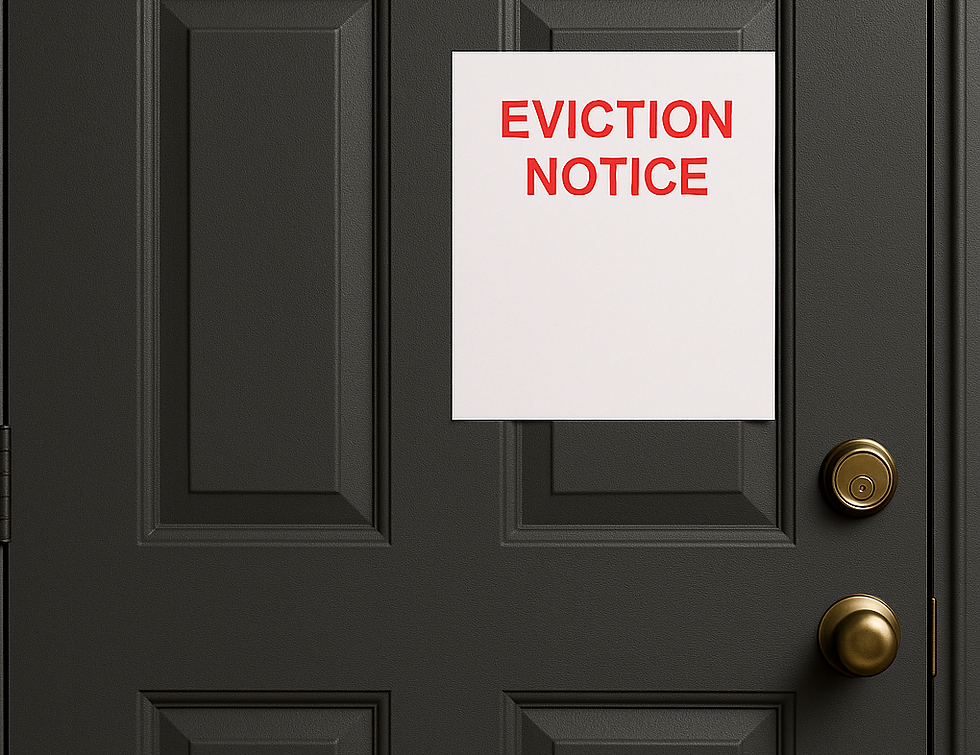The Darkside of Being a Landlord: How to Deal with Non-Paying Tenants
- Laura Frenkel

- Sep 4
- 4 min read

Being a landlord comes with its share of challenges, and one of the toughest is when a tenant stops paying rent. Last year, I went through a horrible eviction that I wouldn’t wish on anyone. We tried to be nice and work with our tenant when they fell behind. At first, it was just a month, then two. Eventually, they stopped paying altogether.
We filed for eviction, but the legal process stretched on for another two months. By the time we regained possession, we were out four months of rent. And that wasn’t even the worst part. The tenant had left behind over $10,000 in damages—dogs left inside with no care meant feces throughout the home, power turned off meant food rotting in the refrigerator, broken doors, and piles of junk that had to be hauled away. Animal control even had to be called.
That experience taught me some hard lessons. While I can’t undo it, I can share what I wish I had done differently to help other landlords avoid the same mistakes.
1. Always Serve Notice Immediately
Even if you want to give your tenant a chance, you must serve the required late notice the day rent is late. The court system already favors tenants, offering them ample time to correct the issue. If you delay, you’re only extending the timeline further. It doesn’t mean you can’t work something out, but serving notice keeps the legal process moving if you need it. Unfortunately, I’ve found that if you’re too lenient, tenants may take advantage.
2. Work with Your Tenant During the Process
As frustrating as it is, it’s often easier to work something out than to collect money from a tenant who isn’t paying. Many tenants simply won’t have the funds once they fall far behind. While you must follow the legal steps, check your local laws about what payments you can accept while the eviction process is underway. In most cases, you can take partial payments and still keep the process active until you’re made whole. You may want to work out a termination for the tenant to move out and cut your losses without having to get possession through a formal eviction.
3. Cash is King
Over time, I’ve shifted to requiring first month, last month, and a full security deposit before move-in. It’s not always easy to collect up front, but it gives you a financial buffer. Holding more cash at the start can make all the difference if things go wrong later.
4. Screen Tenants Thoroughly
A strong lease starts with strong tenants. Always run credit checks, verify employment, and request landlord references. If something feels off during the screening process, trust your gut. It’s better to leave a property vacant for a little longer than to rush into signing with the wrong tenant.
5. Keep Documentation and Communication in Writing
From the first late payment to the last conversation, keep everything documented. Save texts, emails, and letters. If you ever need to go to court, a paper trail is your best defense. Plus, clear written communication avoids misunderstandings.
6. Know Your Local Laws (and Have an Attorney Ready)
Every state and even city can have different landlord-tenant laws. Before you ever have a problem, familiarize yourself with the process and, if possible, establish a relationship with a landlord-tenant attorney. That way, if you need to act quickly, you already have a trusted advisor. You can go through the process without an Attorney to save some money. Make sure you have read up on your requirements as a Landlord. If you make a mistake the tenant may be granted extra time.
7. Special Note for Commercial Landlords: Watch for State Tax Issues
With commercial tenants, there’s another wrinkle most landlords don’t realize until it’s too late: if a business tenant fails to pay state sales taxes, the state or municipality may have the right to take possession of the space or place liens on the tenant’s property inside.
A client recently learned this the hard way. On a recent eviction, even though they were the landlord, the state had rights that complicated the process. In some cases as happened here, the Department of Revenue can lock and “red tag” a space until taxes are paid, which means you may not be able to access your own property until the tenant’s issue with the state is resolved.
This makes due diligence even more important:
Monitor your tenant’s compliance (sometimes public records show delinquent taxes).
Include language in your lease requiring tenants to remain current on taxes and allowing you to step in if they fall behind.
Stay in touch with your attorney if you suspect problems, because state liens or seizures can delay your ability to re-lease the space.
It’s a hidden risk many landlords overlook, but one that can cost months of downtime.
Being a landlord has incredible benefits, but it also comes with risk. The key lesson I learned is this: be compassionate, but also protect yourself. Start the legal process the moment a tenant falls behind, while still leaving room to work things out. And above all, never underestimate the power of good screening, strong leases, and financial safeguards.
With the right systems and mindset, you can minimize your risks, recover more quickly, and keep your rental property working for you instead of against you.




Comments